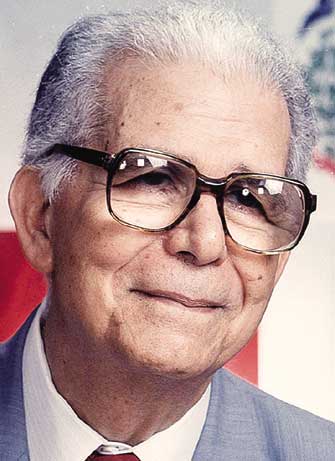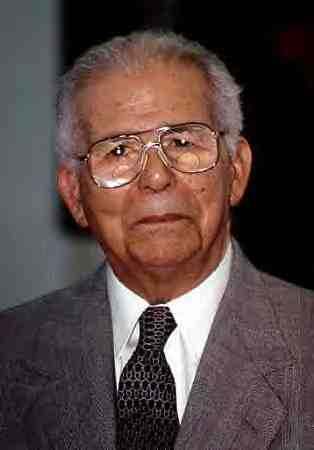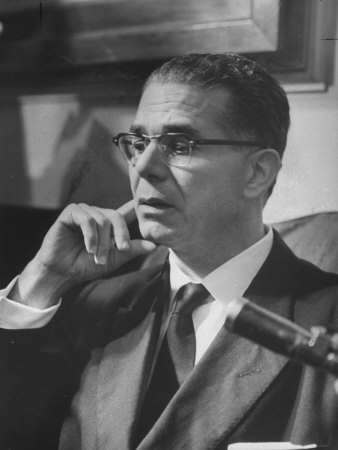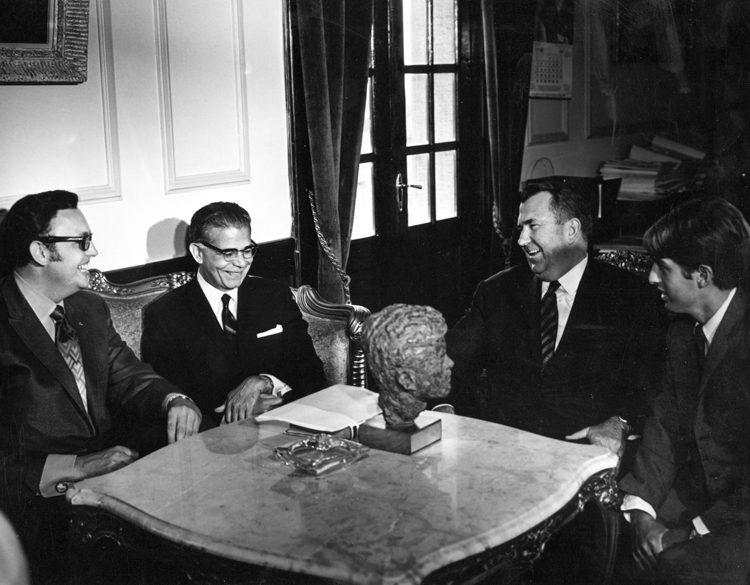<Back to Index>
- Physician Andrija Štampar, 1888
- Composer Johann Pachelbel, 1653
- President of the Dominican Republic Joaquín Antonio Balaguer Ricardo, 1906
PAGE SPONSOR



Joaquín Antonio Balaguer Ricardo (September 1, 1906 – July 14, 2002) was the President of the Dominican Republic from 1960 to 1962, from 1966 to 1978, and again from 1986 to 1996.
Balaguer was born in Villa Bisonó (also known as Navarrete), Santiago Province in the northwestern corner of the Dominican Republic. His father was Joaquín Balaguer Lespier, a Puerto Rican of Catalan ancestry, and his mother was Carmen Celia Ricardo, daughter of Manuel de Jesus Ricardo and Rosa Amelia Heureaux. He was the only son in a family of several daughters.
From a very early age, Balaguer felt an attraction to literature, composing verses that were published in local magazines even when he was very young. He became involved in politics due to the American military occupation (1916 – 24). After graduating from school, Balaguer earned a law degree from the University of Santo Domingo and studied for a brief period at the University of Paris I Pantheon - Sorbonne. As a youth, Balaguer wrote of the awe with which he was struck by his father's fellow countryman, the Harvard graduate and political leader from Puerto Rico, Pedro Albizu. Despite the profound differences regarding their ethical and world visions, Albizu's fiery and charismatic rhetoric captured Balaguer's imagination and his recollection of this occasion was a harbinger of his passion for politics and intellectual debate.
Balaguer's political career began in 1930 (before Rafael Trujillo took control of the government) when he was appointed Attorney in the Court of Properties. In later years, he served as Secretary of the Dominican Legation in Madrid (1932 - 1935), Undersecretary of the Presidency (1936), Undersecretary of Foreign Relations (1937), Extraordinary Ambassador to Colombia and Ecuador (1940 - 43 and 1943 - 47), Ambassador to Mexico (1947 - 49), Secretary of Education (1949 - 55), and Secretary of State of Foreign Relations (1955 - 57).
There has been much discussion regarding Balaguer's role during the Era of Trujillo, especially the relationship between the diminutive soft spoken scholar and the boisterous Generalissimo.
Throughout the three decades working as a Trujillista politician,
Balaguer was seen alternately both as a mere employee or as a
distinguished close counselor of Trujillo. Despite the fact that
Trujillo notoriously enjoyed humiliating and insulting his "servants"
in public, the dictator never tried to degrade Balaguer nor to play practical jokes on him. Balaguer
reciprocated Trujillo's respect by spending the three decades of the
Era as one of the most efficient public aides of the dictatorship,
without seeming perturbed or showing the smallest gesture of disgust
for the excesses and aberrations that were common at the time. Balaguer
was, without doubt, a useful minister of Trujillo, although it is not
entirely possible to speak of total loyalty. When Trujillo arranged to have his brother Héctor re-elected to the presidency in 1957, he chose Balaguer as vice-president. Three years later, when pressure from the Organization of American States (OAS)
convinced the dictator that it was inappropriate to have a member of
his family as president, Trujillo forced his brother to resign, and
Balaguer succeeded to the post. However, he had virtually no power, and
was regarded as a mere puppet to Trujillo. The
situation was dramatically altered, however, when Trujillo was
assassinated in 1961. Although he had long been associated with El Benefactor, Balaguer
took steps to liberalize the regime, granting some civil liberties and
easing Trujillo's tight censorship of the press. The OAS was satisfied
enough to lift the economic sanctions imposed on the Dominican Republic
for Trujillo's attempted murder of Venezuelan President Romulo Betancourt. However, Balaguer's tentative reforms were too much for the hard - line trujillistas and did not go nearly far enough for those who wanted more freedom and a more equal distribution of wealth. Due to the pressure exerted by the National Civic Union, a Council of State was created, and Balaguer only retained power until January 16, 1962. A military coup d'état, led by air force chief Rodríguez Echaverría, forced him into exile in New York and Puerto Rico. During those years the Dominican Republic had only seven months of true democracy, under the presidency of Juan Bosch.
When a military coup overthrew Bosch, the country began a tumultuous
period which resulted in the civil war of April 24, 1965. Military
officers had revolted against the provisional Junta to restore Bosch,
whereupon U.S. President Lyndon Johnson, under the pretext of eliminating Communist influence in the Caribbean sent 42,000 U.S. troops to defeat the revolt in Operation Power Pack, on April 28. The provisional government, headed by Héctor García Godoy,
announced general elections for 1966. Balaguer seized his chance, and
using his mother's illness as an excuse, asked permission to return
from exile, which was granted. He formed the Reformist Party and
entered the presidential race against Bosch, campaigning as a moderate
conservative advocating gradual change. He quickly gained the support
of the establishment and easily defeated Bosch, who ran a somewhat
muted campaign out of fear of military retribution. Balaguer
found a nation severely beaten by decades of turbulence, with few short
times of peace, and virtually ignorant of democracy and human rights.
He sought to pacify the enmities surviving from the Trujillo regime and
from the 1965 civil war, but political murders continued to be frequent
during his administration. He succeeded in partially rehabilitating the
public finances, which were in a chaotic state, and pushed through a
modest program of economic development. He was easily reelected in 1970
against fragmented opposition, and won again in 1974 after changing the
voting rules in a way that led the opposition to boycott the race. During
his years as President (known popularly in Dominican politics as simply
"the 12 years"), Balaguer ordered the construction of schools,
hospitals, dams, roads, and many important buildings. He also presided
over steady economic growth. However, his administration soon developed
a distinct authoritarian cast,
constitutional guarantees notwithstanding. Political opponents were
jailed and sometimes killed, and opposition newspapers were
occasionally seized. Despite his authoritarian methods, Balaguer had
far less power than Trujillo, and his rule was much milder. In
1978, Balaguer sought a fourth term. However, by this time, inflation
was on the rise, and the great majority of the people had gotten little
benefit from the economic boom of the past decade. Balaguer faced Antonio Guzmán, a wealthy rancher running under the banner of the Dominican Revolutionary Party.
When election returns showed an unmistakable trend in Guzmán's
favor, the military stopped the count. However, amid vigorous protests
at home and strong pressure abroad, the count resumed. When the returns
were all in, Guzmán handed Balaguer the first loss of his
electoral career. When Balaguer left office that year, it marked the
first time in the Dominican Republic's history that an incumbent
president peacefully surrendered power to an elected member of the
opposition. In the 1982 elections, the PRD's Salvador Jorge Blanco defeated Balaguer, who had merged his party with the Social Christian Revolutionary Party to form the Social Christian Reformist Party two years earlier. Balaguer
ran again in 1986, and took advantage of a split in the PRD and an
unpopular austerity program to win the presidency again after an
eight-year absence. By this time, he was 80 years old and almost
completely blind (he had suffered from glaucoma for many years). Balaguer's
third presidency was considerably more liberal than the previous one.
He was much more tolerant of opposition parties and human rights. He
undertook massive infrastructure projects, such as the construction of
highways, bridges, schools, housing projects and hospitals. Following
the style of Trujillo, these highly visible projects were very
publicized over government controlled media and through grandiose
public ceremonies designed to enhance Balaguer's popularity. The
projects were also used as a means to reward his political supporters
with lucrative public works contracts. The economy also improved
considerably. Balaguer
was narrowly reelected in 1990, defeating his old foe Juan Bosch by
only 22,000 votes out of 1.9 million votes cast amid charges of fraud. For the 500th anniversary of Christopher Columbus' landing in the Americas and the visit of Pope John Paul II, Balaguer spent millions on a restoration of parts of historic, colonial Santo Domingo,
and on sprucing up the parts of the City to be traversed by the Pope,
including the construction of a grand new avenue lined with modern
housing blocks. More controversial was that Balaguer spent two hundred million US Dollars on the construction of a massive ten-story Columbus Lighthouse. Completed in 1992, the Columbus Lighthouse was designed to beam the image of a Christian cross into
the night sky and to be visible for tens of miles. Since completion,
the Columbus Lighthouse, which supposely houses Columbus' remains, has
been a minor tourist attraction. Its light has almost never been used
due to extremely high energy costs and frequent blackouts in the
country. However, its symbolism and expense were the source of much
controversy. In
January 1994 he decided to run again for the presidency, even when he
was almost 90 years old and completely blind. This time, his principal
contender was José Francisco Peña of the PRD. The campaign was one of the nastiest in Dominican history. Balaguer frequently played up Peña's Haitian ancestry
to his advantage; Dominicans historically have a deep fear and mistrust
of anyone with Haitian blood. For example, Balaguer claimed that
Peña would try to merge the country with Haiti if elected. When
the returns were announced, Balaguer was announced as the winner by
only 30,000 votes. However, many PRD supporters showed up to vote only
to discover their names had vanished from the rolls. Peña
screamed fraud, and called a general strike. Demonstrations took place in support of the strike. An
investigation later revealed that the electoral board did not know the
total number of registered voters, and the voting lists distributed at
polling stations did not match those given to the parties. The
investigation also revealed that about 200,000 people had been removed
from the polls. Amid such questions about the poll's legitimacy,
Balaguer agreed to hold new elections in 1996 — in which he would not be
a candidate. In
the 1996 election, Balaguer's vice president, Jacinto Peynado, finished
well short of making it to the runoff. Balaguer then threw his support
to the Dominican Liberation Party's Leonel Fernández in an unusual coalition with Bosch, his political foe of over 30 years. In 2000, Balaguer decided to seek an eighth term as president. He won around 23% of the votes in the election, well short of the runoff. On July 14, 2002, Joaquín Balaguer died of heart failure at Santo Domingo's Abreu Clinic at the age of 95. He was a polarizing figure who could incite as much hate as love from the population. Ronald
Reagan once said of him "President Balaguer has been a driving force
throughout his country's democratic development. In 1966 he led
democracy's return to the Dominican Republic after years of political
uncertainty and turmoil. Indeed, he is, in many ways, the father of
Dominican democracy" and Jimmy Carter complimented him saying
"President Balaguer has set an example for all leaders in this nation
in changing his own country and his own people away from a former
totalitarian government to one of increasingly pure democracy." Balaguer
was a prolific author, who wrote many books for contemporary Dominican
literature. His most famous work was his only narrative novel, called "Los Carpinteros". The most controversial of his works is perhaps "Memorias de un Cortesano en la Era de Trujillo", in which Balaguer, shielded by his political power admitted knowing the truth about the death of the revolutionary journalist Orlando Martínez. Balaguer left a blank page in the middle of the book to be filled in at the time of his death. Balaguer
explored several branches of literature. As a thorough researcher, he
published many biographical books still used as reference, along with
compilations and analysis of Dominican folk poets. As a poet, he was
mostly of Post-Romantic influence, and his style remained strictly
unchanged along his long career. Other themes, despite the sorrow
expressed, are mostly noble: an idyllic view of nature, nostalgia, and
memoirs of the past.
